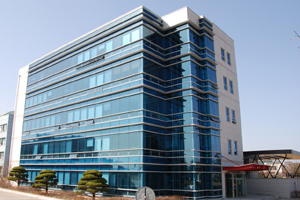policy
KAIST dedicated the KOCED Geo-Centrifuge Experiment Center for researches in monitoring natural disasters such as earthquake and embankment collapse through miniature simulation tests on Wednesday (April 9) after a two-year construction work.
The experiment center is part of the Korea Construction Engineering Development Collaboratory Program (KOCED) which has been sponsored by the Ministry of Land, Transport and Maritime Affairs to build an infrastructure for construction engineering researches at a national level. The ministry plans to build a total of 5 similar centers nationwide by the end of the year.
On hand at the dedication ceremony were Jae-Choon Lee, President of the Korea Institute of Construction & Transportation Technology Evaluation and Planning, KAIST President Nam-Pyo Suh, and scores of experts and administration officials.
The construction of the five-story building on an area of about 3,328 square meters cost 8.4 billion won (US$6.3 million).
The center is expected to serve as a major laboratory in the field of geotechnical engineering. It is equipped with such state-of-the-art facilities as geocentrifuge, a useful tool for studying flow in unsaturated soil under well-controlled, repeatable conditions, a bidirectional shaking-table that can reproduce earthquake-like wave; and robots that can reproduce construction procedures by remote control.
Geocentrifuge experiment allows detecting ground and structure motions easily and rapidly by simulation tests. Thus, it is widely used for various geotechnical engineering researches such as evaluation of seismic safety, soft ground movement, slope stability analysis, etc. The causes of the embankment collapse in New Orleans by Hurricane Katrina in 2005 were also revealed by the geocentrifuge experiment.
The geocentrifuge research facility is available for use by outside researchers, so scientists from other universities, research institutes and corporations can perform research and test their scientific and engineering hypotheses.
The center is divided into two sections, experiment building and research building. The experiment building is composed of a geocentrifuge laboratory, model-making rooms, workshops, a geotechnical engineering laboratory and specimen storehouse, while the research building has a control room, a video conference room, an electronic library and research rooms.

-
event Formosa Group of Taiwan to Establish Bio R&D Center at KAIST Investing 12.5 M USD
KAIST (President Kwang-Hyung Lee) announced on February 17th that it signed an agreement for cooperation in the bio-medical field with Formosa Group, one of the three largest companies in Taiwan. < Formosa Group Chairman Sandy Wang and KAIST President Kwang-Hyung Lee at the signing ceremony > Formosa Group Executive Committee member and Chairman Sandy Wang, who leads the group's bio and eco-friendly energy sectors, decided to establish a bio-medical research center within KAIST and i
2025-02-17 -
research KAIST Develops Wearable Carbon Dioxide Sensor to Enable Real-time Apnea Diagnosis
- Professor Seunghyup Yoo’s research team of the School of Electrical Engineering developed an ultralow-power carbon dioxide (CO2) sensor using a flexible and thin organic photodiode, and succeeded in real-time breathing monitoring by attaching it to a commercial mask - Wearable devices with features such as low power, high stability, and flexibility can be utilized for early diagnosis of various diseases such as chronic obstructive pulmonary disease and sleep apnea < Photo 1. Fro
2025-02-13 -
research KAIST Uncovers the Principles of Gene Expression Regulation in Cancer and Cellular Functions
< (From left) Professor Seyun Kim, Professor Gwangrog Lee, Dr. Hyoungjoon Ahn, Dr. Jeongmin Yu, Professor Won-Ki Cho, and (below) PhD candidate Kwangmin Ryu of the Department of Biological Sciences> A research team at KAIST has identified the core gene expression networks regulated by key proteins that fundamentally drive phenomena such as cancer development, metastasis, tissue differentiation from stem cells, and neural activation processes. This discovery lays the foundation for dev
2025-01-24 -
event A heated battle of science and sports, who is the winner of this year's KA-PO War?
< Photos from KAIST-POSTECH Science War (photographed by Student Junhyeok Park of KAIST Freshman Course) > The future leaders of science at KAIST and POSTECH (President Seong Keun Kim) held their annual science and sporting event at POSTECH for two days from September 20th to 21st. The 'KAIST-POSTECH Science War (hereafter KA-PO War)' is a festival consisting of science and sports games and various side events to promote exchange and cooperation between the two universities. It is als
2024-09-19 -
event The 3rd Global Entrepreneurship Summer School (GESS 2024) Successfully Completed in Silicon Valley
The 2024 Global Entrepreneurship Summer School (2024 KAIST GESS), hosted by the Office of Global Initiatives under the KAIST International Office (Director Man-Sung Yim), was held for the third time. This program allows students to visit Silicon Valley, a global startup hub, to directly experience its famous startup ecosystem and develop their capabilities for global expansion. A total of 20 students were selected through applications, interviews, final presentations, mentoring, and peer evaluat
2024-07-03